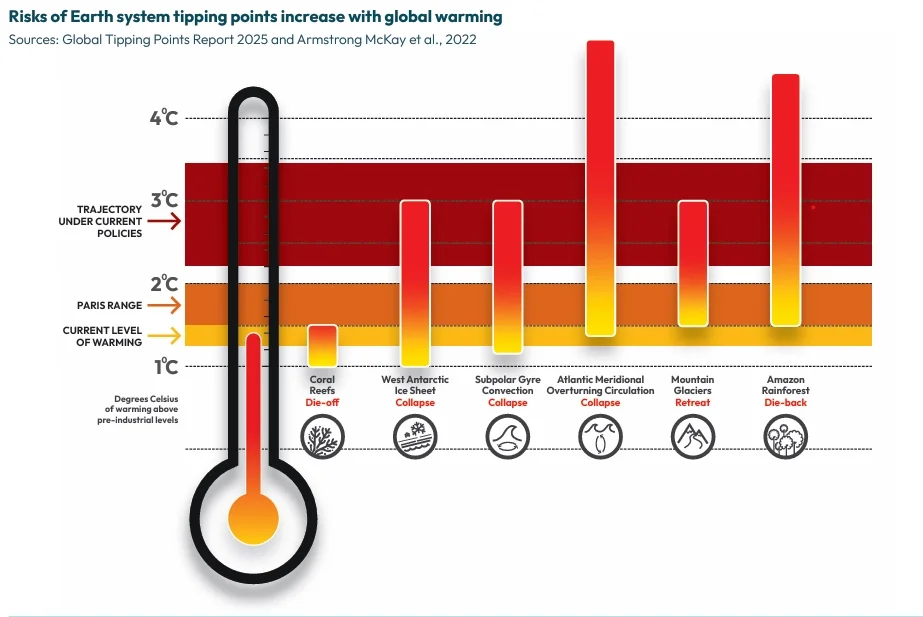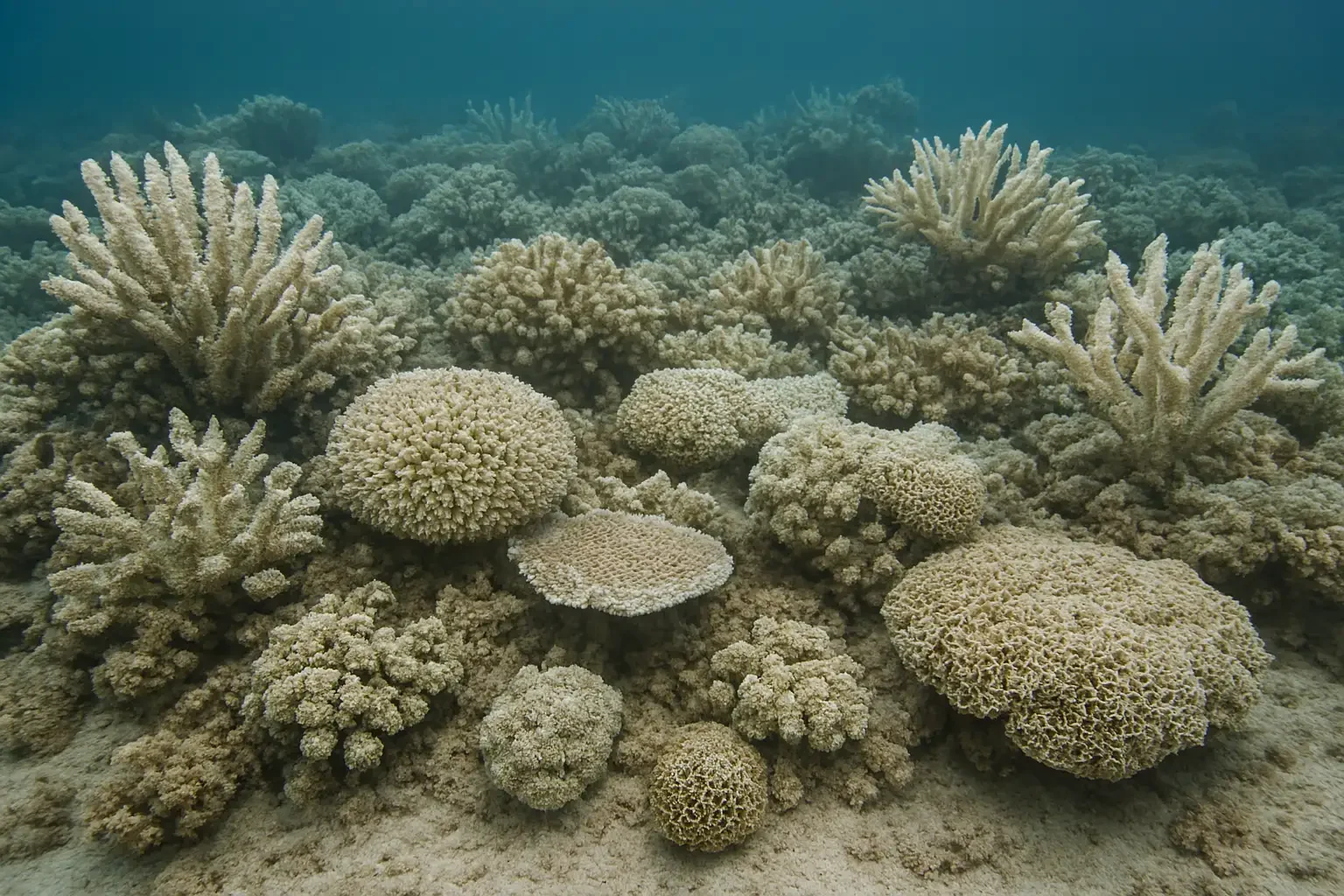Coral Reefs in Crisis: Insights from the Global Tipping Points Report 2025
Coral reefs have tipped — but the Global Tipping Points Report 2025 shows recovery is still possible through rapid, systemic change.
The Earth’s climate is changing faster now than at any other point in human history and the ocean is at the forefront of this transformation. The newly released Global Tipping Points (GTP) Report, developed by 160 scientists from 23 countries, delivers a sobering message: warm-water coral reefs are the first major ecosystem to cross a climate tipping point.
Coral reefs are among Earth’s richest and most productive ecosystems, supporting around 25% of all marine life and underpinning food production, coastal protection, tourism and cultural values for nearly a billion people around the world. With global temperatures now reaching 1.4°C above pre-industrial levels, these ecosystems are undergoing a phase of widespread, potentially irreversible dieback.
Yet, beyond this devastating news, the report also offers hope. It outlines how positive tipping points could ignite rapid recovery. In this article, we explore some of key findings revealed by the GTP Report 2025 and discuss what steps are still possible to safeguard coral reefs and other Earth ecosystems.
Key Findings:
Coral reefs have crossed a climate tipping point: Widespread coral mortality marks the first major ecosystem collapse driven by global heating.
Irreversible loss looms: At 1.4 °C of warming, warm-water coral reefs have already crossed their thermal tipping point and are undergoing unprecedented dieback — preventing the permanent loss of these ecosystems as we know them will require cooling global temperatures below 1.5°C, and ideally towards 1°C.
Tipping points are no longer theoretical: Climate risks are accelerating, with multiple Earth systems nearing or breaching thresholds that could trigger irreversible change.
Positive tipping points offer hope: Rapid, self-reinforcing shifts, such as the rise of clean energy and sustainable food systems, can counteract harmful trends quickly and strategically.
Governance is critical: The report calls for proactive planning to trigger and manage tipping points through climate adaptation, finance and cooperation.
Time is short but transformation is possible: Coordinated global action can steer us towards a safer, more equitable future if we act decisively.
What is a Climate Tipping Point?
A climate tipping point is a threshold where gradual environmental change triggers sudden, self-reinforcing shifts in an ecosystem’s state. Once crossed, these thresholds can trap ecosystems in degraded states – much like a canoe, which once overturned takes more far more effort to right.
Coral Reefs: The First Ecosystem to Tip
The report identifies warm-water corals reefs as the first ecosystem to breach a climate tipping point. Earlier studies predicted that if global temperatures reached 1.2°C above pre-industrial levels, then warm water corals would likely face severe and frequent bleaching. The GTP report confirms that temperatures over the last two years have reached 1.4°C above pre-industrial levels, meaning that we have already surpassed the 1.2°C threshold and many reef systems have already exceeded their safe thermal limits.
The ongoing 2023-2025 global bleaching event has been the most extensive ever recorded, impacting 84% of reefs globally (Tollefson, 2025). This marks a critical threshold in Earth’s ecological history.
Source: Global Tipping Points Report 2025; Armstrong McKay et al., 2022
This graphic shows how rising temperatures increase the risk of irreversible change across key Earth systems. Coral reefs tip first—at just 1.2 °C—underscoring their extreme vulnerability to climate stress.
Why are Coral Reefs so Vulnerable?
Coral reefs exceptional sensitivity arises from a combination of biological and environmental factors:
Symbiotic dependence: Reef-building corals rely heavily upon microscopic algae known as zooxanthellae which reside within their tissue for up to 90% of their energy. Loss of this partnership leaves the corals in a starved and weakened state, making them more vulnerable to other stressors such as disease.
Narrow thermal windows: Many corals thrive within a 1-2°C temperature range, with even slight deviations in this leading to them expelling their algae.
Slow growth rates: Frequent bleaching events reduce the time in which corals have to recover, making regeneration difficult.
Ocean acidification: Increased CO2 absorption lowers seawater pH levels, reducing calcium carbonate saturation and weakening coral skeletons.
Local stressors: Overfishing, pollution, and sedimentation further degrade reef resilience by altering ecological balances and smothering coral polyps.
Together, these stressors shorten recovery windows and amplify the severity of each bleaching event, making reefs uniquely prone to tipping.
Cascading Ecological & Socioeconomic Impacts
When reefs collapse, the effects ripple through marine and human systems resulting in the following:
Biodiversity loss: Reef-dependent species decline sharply, reducing overall marine species richness.
Fisheries decline: Coastal fisheries yields can drop up to 40%, threatening the food security and livelihoods of millions, (CAF, 2021).
Eroded coastal protection: Healthy reefs buffer wave energy and storm surges, the degradation of reefs leaves shorelines vulnerable to erosion and flooding.
Economic and cultural costs: Tourism revenues and cultural heritage tied to reefs vanish, disproportionately impacting small island and coastal communities.
Pathways to Positive Tipping Points
While the GTP Report confirms that coral reefs have already crossed a devastating climate tipping point, it also outlines a hopeful path forward: the emergence of positive tipping points that could reverse decline and regenerate Earth ecosystems at scale.
Once triggered, these beneficial shifts become self-reinforcing, driving forward a shift towards sustainability. The report highlights several positive tipping points could and are already emerging:
Clean energy: Solar, wind, and electric vehicles are reshaping global energy systems.
Food systems: Shifts towards plant-based diets and sustainable agriculture are gaining momentum, with potential to reduce emissions and regenerate nature.
Finance and infrastructure: Investment reform can unlock clean infrastructure and climate resilience.
Social movements and climate justice: Legal action, community-led initiatives, and inclusive governance are proving to be powerful catalysts for chance.
The report urges leaders to pro-actively govern tipping points, not to just react. This means designing policies, investments, and collaborations that trigger and sustain these shifts before harmful tipping points become irreversible.
Final Thoughts
The GTP Report sends a grave and urgent message but also provides a blueprint to move forward. It reframes climate action as a race between tipping points. While coral reefs have already crossed a critical threshold, the report emphasises that rapid, systematic change is still possible. If we act strategically and inclusively, positive tipping points can help steer us towards a safer, more equitable and sustainable future.
At Ocean Revive, we remain deeply committed to doing our part: advancing coral restoration science, supporting global collaboration, and help shaping conditions for recovery. The tipping point for coral reefs may have passed, but the tipping point for action is still ahead.
Visit our News & Insight page to learn more about the latest restoration breakthroughs or contact us to learn how you can join the movement for ocean resilience.
Access the full Global Tipping Points Report here.
Biblography
Armstrong McKay, D.I. et al. (2022). Exceeding 1.5°C global warming could trigger multiple climate tipping points. Science, 377(6611), pp. eabn7950. [online] Available at: https://www.science.org/doi/abs/10.1126/science.abn7950 [Accessed 14 Oct. 2025].
CANARI (2021). Lessons from Caribbean fisheries livelihood initiatives. [pdf] Caribbean Natural Resources Institute. Available at: https://canari.org/wp-content/uploads/2019/10/Report_Lessons-from-Carib-fisheries-livelihood-initiativesFinalJul2021.pdf [Accessed 14 Oct. 2025].
Global Tipping Points (2025). Global Tipping Points Report 2025. [online] Available at: https://global-tipping-points.org [Accessed 14 Oct. 2025].
Tollefson, J. (2025). Climate tipping points are coming — scientists must warn policymakers. Nature, [online] Available at: https://www.nature.com/articles/d41586-025-03316-w [Accessed 14 Oct. 2025].



